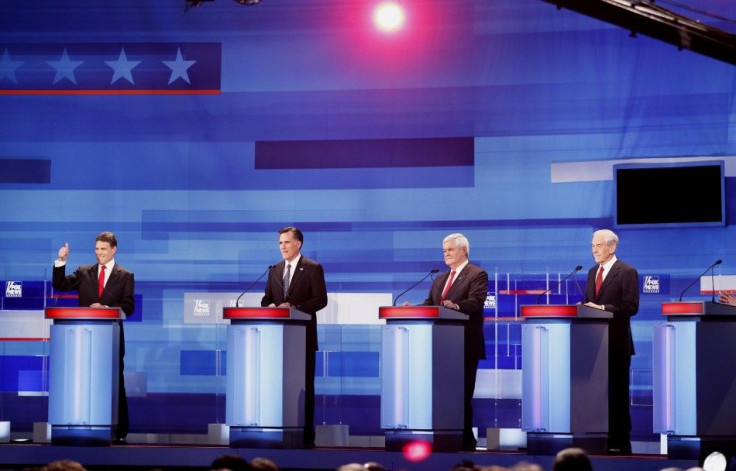Iowa Caucus: NBC Poll Confirms Santorum Surge, Gingrich Fall

The results of an NBC-Marist poll released on Friday closely resemble the results of a CNN/Time/ORC poll released earlier this week, affirming an 11th-hour picture of the Iowa caucuses in which Rick Santorum has suddenly shed his sidenote status and Newt Gingrich has become virtually irrelevant.
The NBC poll shows Mitt Romney with 23 percent support and Ron Paul with 21 percent support: a statistical tie for first place. There is a three-way statistical tie for third place -- Santorum with 15 percent support, Rick Perry with 14 percent and Gingrich with 13 percent -- followed by Michele Bachmann with 6 percent and Jon Huntsman with 2 percent. This order is almost identical to what the CNN/Time poll found, except that Gingrich and Perry traded places.
Now It's Romney and Paul in Statistical Dead-Heat
Together, the NBC and CNN polls show two races in Iowa: one for first place and the other for third.
It seems the top spot is a toss-up between Romney and Paul, and third place will go to Santorum, Gingrich or Perry, in that order of likelihood. The significance of each placing, however, varies greatly from candidate to candidate.
Paul needs to finish first in Iowa if he wants to mount a serious challenge to Romney in New Hampshire, where the former Massachusetts governor has held double-digit leads throughout the year. If Paul places second behind Romney, it will be harder for him to sell himself as the candidate with momentum. Romney, on the other hand -- though losing to Paul would certainly hurt him -- could absorb a second-place finish in the long run, because he was never likely to win Iowa, and he knows New Hampshire is his firewall.
Sudden Life for Santorum
As for the runner-up race, Santorum would benefit the most from a third-place finish because it would so dramatically exceed his expectations: a month ago, he was averaging 4 percent support in Iowa, and just last week, he was averaging 7 percent. Beating Gingrich would draw a flood of media attention to Santorum's campaign and finally give him the (probably temporary) front-runner stint that everyone else except Huntsman has enjoyed.
Perry, too, would get a boost for exceeding expectations if he finished third, but probably not as much of a boost as Santorum would get, because Perry has already had his time in the spotlight, while Santorum is a fresh face.
Gingrich is the clear loser in the picture painted by the NBC and CNN polls, because even if he manages to edge out Santorum and Perry for third place, he would fall short of what is expected of him. Since he has been the front-runner for most of the past month, at one point holding a double-digit lead over Romney, a third-place finish for him would be an unequivocal flop. If Gingrich lost to both Romney and Paul, there would be no way for him to spin it as a victory -- and if he didn't rebound dramatically in New Hampshire, his campaign would be dead.
With the numbers so close, it is impossible to predict whether Romney or Paul will come out on top next Tuesday, but Lee Miringoff, the director of the Marist College Institute for Public Opinion, said that even if Romney ends up losing to Paul, he will still have benefited from the division of conservative support among several candidates. If that support were not divided, Romney would be at risk of finishing third, behind Paul and a conservative challenger like Gingrich, Perry or Bachmann.
This is the Romney dream scenario, Miringoff said after the NBC-Marist poll was released. When you look at the Tea Party and conservatives, they are all splintered.
Also, while Romney's supporters are not nearly as enthusiastic or loyal as Paul's and other candidates', he benefits from a larger percentage of people who would consider voting for him if their first choice dropped out.
According to the poll, only 21 percent of likely caucus-goers would refuse to support Romney. By contrast, 35 percent said they would never support Gingrich and 41 percent said they would never support Paul.
--
© Copyright IBTimes 2024. All rights reserved.











